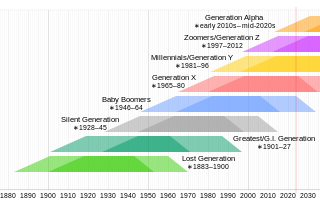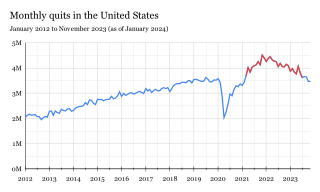Related Research Articles

Unisys Corporation is an American multinational information technology (IT) services and consulting company founded in 1986 and headquartered in Blue Bell, Pennsylvania. The company provides digital workplace, cloud applications and infrastructure, enterprise computing, business process, AI technology, and data analytics services.
A generation gap or generational gap is a difference of opinions and outlooks between one generation and another. These differences may relate to beliefs, politics, language, work, demographics and values. The differences between generations can cause misunderstandings, but it is possible for generations to overcome their differences and maintain functional relationships.

Remote work is the practice of working from one's home or another space rather than from an office.

A white-collar worker is a person who performs professional service, desk, managerial, or administrative work. White-collar work may be performed in an office or other administrative setting. White-collar workers include job paths related to government, consulting, academia, accountancy, business and executive management, customer support, design, economics, engineering, market research, finance, human resources, operations research, marketing, public relations, information technology, networking, law, healthcare, architecture, and research and development. In contrast: blue-collar workers perform manual labor or work in skilled trades; pink-collar workers work in care, health care, social work, or teaching; and grey-collar jobs combine manual labor and skilled trades with non-manual or managerial duties.

Generation Z, also known as Zoomers, is the demographic cohort succeeding Millennials and preceding Generation Alpha. Researchers and popular media use the mid-to-late 1990s as starting birth years and the early 2010s as ending birth years, with the generation most frequently being defined as people born from 1997 to 2012. Most members of Generation Z are the children of younger Baby Boomers or Generation X.
A virtual workplace is a work environment where employees can perform their duties remotely, using technology such as laptops, smartphones, and video conferencing tools. A virtual workplace is not located in any one physical space. It is usually a network of several workplaces technologically connected without regard to geographic boundaries. Employees are thus able to interact in a collaborative working environment regardless of where they are located. A virtual workplace integrates hardware, people, and online processes.

Occupational safety and health (OSH) or occupational health and safety (OHS) is a multidisciplinary field concerned with the safety, health, and welfare of people at work. OSH is related to the fields of occupational medicine and occupational hygiene and aligns with workplace health promotion initiatives. OSH also protects all the general public who may be affected by the occupational environment.

UKG is an American multinational technology company with dual headquarters in Lowell, Massachusetts, and Weston, Florida. It provides workforce management and human resource management services.
Sexism in the technology industry is overt, subtle, or covert occupational sexism which makes the technology industry less friendly, less accessible, and less profitable for women. While the participation of women in the tech industry varies by region, it is generally around 4% to 20% depending on the measure used. Possible causes that have been studied by researchers include gender stereotypes, investment influenced by those beliefs, a male-dominated environment, a lack of awareness about sexual harassment, and the culture of the industry itself. Margaret O'Mara, a professor of history at the University of Washington, in 2019 concluded that Silicon Valley is uniquely influential locale that is shaping our world. But she points to problematic failures regarding diversity. Male oligopolies of high-tech power have recreated traditional environments that repress the talents and ambitions of women, people of color, and other minorities to the benefit of whites and Asian males.
The working environment has gone through a major transformation over the last decades, particularly in terms of population in the workforce. The generations dominating the workforce in 2024 are baby boomers, Generation X, millennials and Generation Z. The coming decades will see further changes with emergence of newer generations, and slower removal of older generations from organisations as pension age is pushed out. Many reports, including a publication by Therese Kinal and Olga Hypponen of Unleash, warn that understanding differences between the generations, and learning to adapt their management practices is critical to building a successful multigenerational workplace.
A cusper is a person born near the end of one generation and the beginning of another. People born in these circumstances tend to have a mix of characteristics common to their adjacent generations, but do not closely resemble those born in the middle of their adjacent generations, and thus these cusper groups can be considered micro generations. Generational profiles are built based on people born in the middle of a generation rather than those on the tails of a generation. Generations may overlap by five to eight years. As such, many people identify with aspects of at least two generations. The precise birth years defining when generations start and end vary. Lancaster and Stillman (2002) introduced the term, cusper, in reference to those who are born at either end of a generation, and consequently, may identify to some extent with the generation before or after it. The authors observed that such individuals can often play an important role in mediating dialogue between members of different generations. Other authors like Ubl, Walden and Arbit (2017) observed something similar: "the truth is that they play a pivotal role in ensuring seamless communication across generations. Cuspers are natural translators because they often speak the language of two generations. Sometimes we even call them generationally bilingual!"

Generation Z, colloquially known as Zoomers, is the demographic cohort succeeding Millennials and preceding Generation Alpha.

The Volkswagen Golf (Mk8) is a compact car, the eighth generation of the Volkswagen Golf and the successor to the Volkswagen Golf Mk7. It was launched in Wolfsburg on 24 October 2019, and arrived in German showrooms in December 2019.
Tensions between the multinational technology company Google and its workers escalated in 2018 and 2019 as staff protested company decisions on a censored search engine for China, a military drone artificial intelligence, and internal sexual harassment.

Alder Lake is Intel's codename for the 12th generation of Intel Core processors based on a hybrid architecture utilizing Golden Cove performance cores and Gracemont efficient cores. It is fabricated using Intel's Intel 7 process, previously referred to as Intel 10 nm Enhanced SuperFin (10ESF). The 10ESF has a 10%-15% boost in performance over the 10SF used in the mobile Tiger Lake processors. Intel officially announced 12th Gen Intel Core CPUs on October 27, 2021, mobile CPUs and non-K series desktop CPUs on January 4, 2022, Alder Lake-P and -U series on February 23, 2022, and Alder Lake-HX series on May 10, 2022.

Alphabet Workers Union (AWU), also informally referred to as the Google Union, is an American trade union of workers employed at Alphabet Inc., Google's parent company, with a membership of over 800, in a company with 130,000 employees, not including temps, contractors, and vendors in the United States. It was announced on January 4, 2021 with an initial membership of over 400, after over a year of secret organizing, and the union includes all types of workers at Alphabet, including full-time, temporary, vendors and contractors of all job types.

The Campaign to Organize Digital Employees or CODE-CWA is a project launched by the Communications Workers of America to unionize tech and video game workers in January 2020. It sprung out of conversations with Game Workers Unite (GWU) and employed at least two full time staff, including GWU co-founder Emma Kinema and veteran SEIU organizer Wes McEnany. In 2022, Jessica Gonzalez joined, a former Activision Blizzard QA tester.

Zillennials is the demographic cohort on the cusp of the Millennial and Generation Z cohorts. Their adjacency between the two generations and limited age set has led to their characterization as a "micro-generation." They are generally the children of younger Baby Boomers and Generation X. Estimates of the U.S. population in this cohort range from 30 million to 48 million.

The Great Resignation, also known as the Big Quit and the Great Reshuffle, was a mainly American economic trend in which employees voluntarily resigned from their jobs en masse, beginning in early 2021 during the COVID-19 pandemic. Among the most cited reasons for resigning included wage stagnation amid rising cost of living, limited opportunities for career advancement, hostile work environments, lack of benefits, inflexible remote-work policies, and long-lasting job dissatisfaction. Most likely to quit were workers in hospitality, healthcare, and education. In addition, many of the resigning workers were retiring Baby Boomers, who are one of the largest demographic cohorts in the United States.
References
- 1 2 3 4 5 Pickup, Oliver (14 December 2022). "Gen Z workers are not tech-savvy in the workplace – and it's a growing problem". WorkLife. Retrieved 14 July 2024.
- ↑ Cassell, Alexandra (16 October 2023). "Are Gen Z Really Afraid of Printers and What Is "Tech Shame"?". ReadWrite. Retrieved 14 July 2024.
- ↑ Hart, Jordan (Dec 16, 2022). "'Tech shame' is hitting young colleagues the hardest as they try to fix older colleagues' technical issues and their own". Business Insider. Retrieved 14 July 2024.
- ↑ Demopoulos, Alaina (28 February 2023). "'Scanners are complicated': why Gen Z faces workplace 'tech shame'". The Guardian. Retrieved 14 July 2024.
- ↑ Hetler, Amanda (June 1, 2023). "Tech shame explained: Everything you need to know". TechTarget . Retrieved 14 July 2024.
- ↑ Taylor, Ben (5 May 2023). "Gen Z's tech shame". The Bridge IT Recruitment. Retrieved 14 July 2024.
- ↑ "HYBRID WORK: ARE WE THERE YET?" (PDF). HP. 2022. Retrieved 14 July 2024.
- ↑ Berger, Chloe (15 December 2022). "Gen Z is overwhelmed by 'tech shame' at work—and it's keeping them quiet in meetings". Yahoo Finance. Retrieved 14 July 2024.